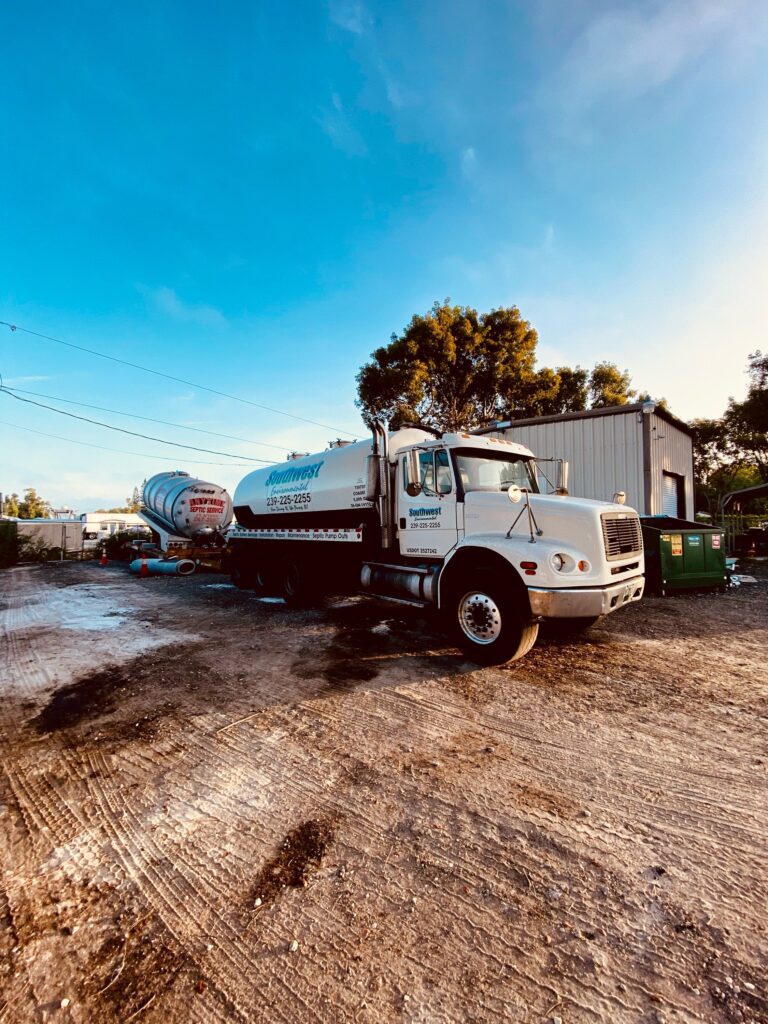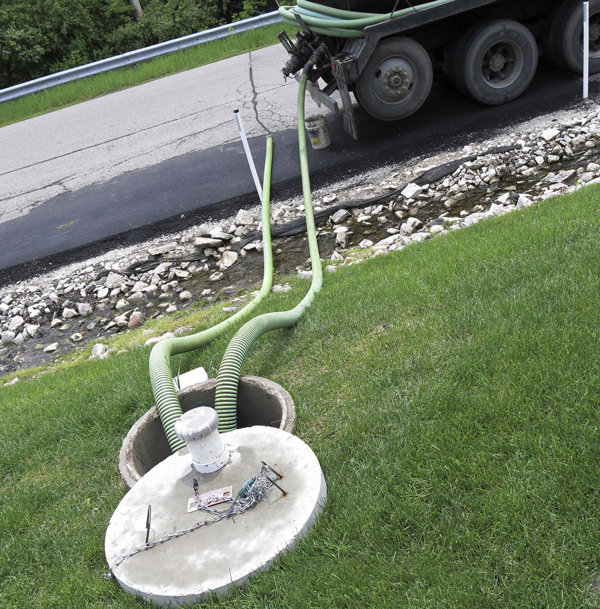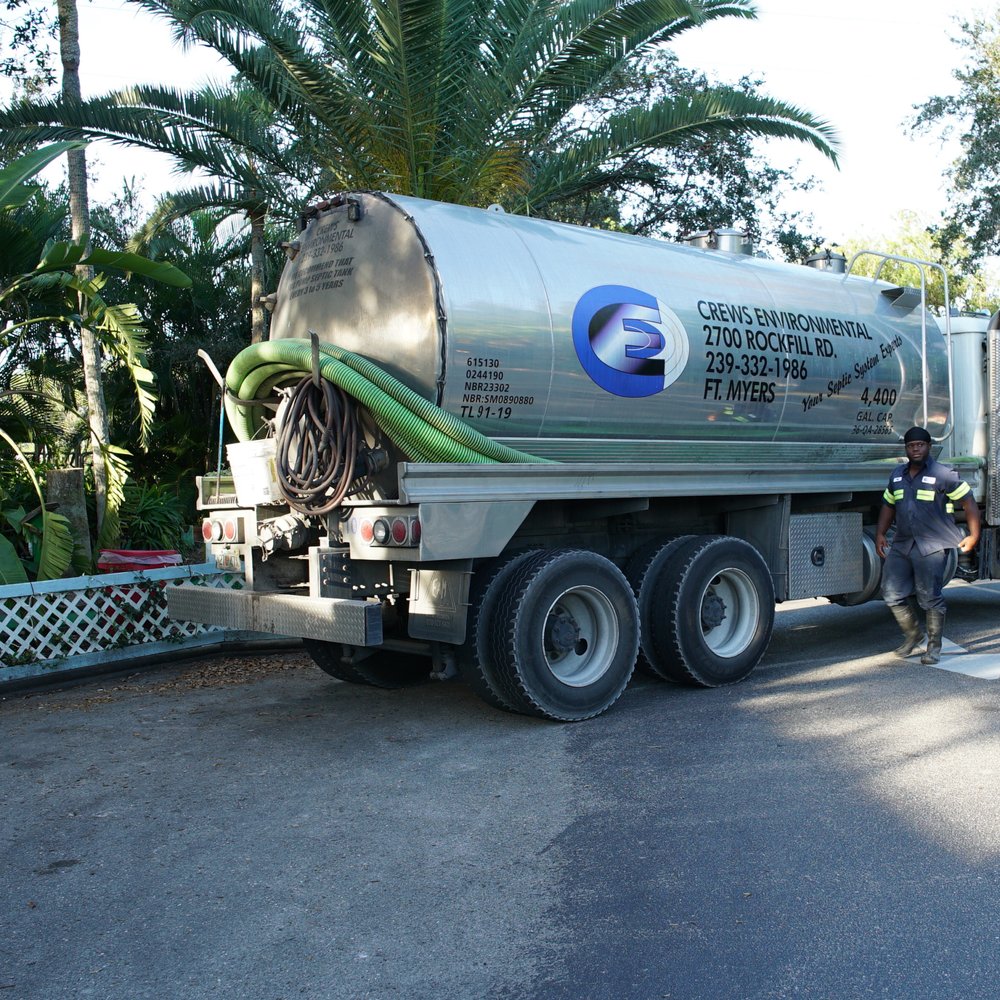In this article, you will learn about the importance of septic tank pumping and how to find reliable services in Lehigh Acres. Maintaining a clean and properly functioning septic system is crucial for the health and hygiene of your home. By understanding the signs that indicate the need for septic tank pumping, you can prevent potential issues and ensure the longevity of your wastewater management system. Additionally, we will provide you with tips on how to find trustworthy professionals who can efficiently and affordably handle this task.
If you are in Lehigh Acres and in need of septic tank pumping services, it is important to find a reliable and experienced company. Look for professionals who have a proven track record in the industry and positive customer reviews. Consider asking for referrals from friends, family, or neighbors who have recently had their septic tanks pumped. Additionally, make sure the company you choose utilizes equipment and methods that comply with environmental regulations and guidelines. By choosing the right septic tank pumping service, you can ensure the continued efficiency and proper functioning of your septic system.
Understanding Septic Tank Pumping
What is a septic tank?
A septic tank is an underground wastewater treatment system that is commonly used in areas where access to a centralized sewer system is not available. It consists of a large tank made of concrete or plastic, which allows for the natural breakdown of waste materials. The septic tank is designed to separate solids from liquids and then allow the liquid to drain into the soil through a drainfield. This process helps to prevent groundwater contamination and protects the environment.
How does a septic tank work?
The working principle of a septic tank is relatively simple. When wastewater from your home enters the septic tank, it is held there long enough for the solids to settle at the bottom and form a layer of sludge. The lighter solids, such as grease and oils, float to the top and create a layer of scum. The remaining liquid, known as effluent, is then drained into the drainfield through perforated pipes.
Once in the drainfield, the effluent is further treated by filtering through layers of soil, which act as natural filters, removing harmful bacteria and other contaminants. This process allows the groundwater to be replenished with clean water.
Why is septic tank pumping necessary?
Septic tank pumping is necessary to prevent the buildup of sludge and scum, which can negatively impact the performance of the septic system. Over time, the solids that settle at the bottom of the tank will accumulate, reducing the effective capacity of the tank and potentially causing backups and sewage overflows. Similarly, the layer of scum that forms on top of the wastewater can prevent proper separation of liquids and solids.
Regular pumping of the septic tank removes the accumulated sludge and scum, allowing the tank to function efficiently. Without regular pumping, the septic system can become overloaded, leading to costly repairs and potential damage to the drainfield and surrounding environment.
What happens during septic tank pumping?
During septic tank pumping, a professional service provider will first locate the septic tank using specialized tools and equipment. Once the tank is located, the work area will be properly prepared to ensure a safe and efficient pumping process.
Using a vacuum truck, the contents of the septic tank, including the sludge and scum layers, will be carefully pumped out. It is essential to choose a professional service for this task as they have the expertise and equipment to remove the waste without causing any damage to the septic system or the surrounding area.
After the tank has been emptied, it will undergo a thorough cleaning and inspection to ensure that all waste materials have been effectively removed. Any signs of damage or cracks in the tank will be noted and reported to the homeowner. Finally, the septic waste is properly disposed of according to local regulations and environmental guidelines.
Signs and Symptoms of a Full Septic Tank
Slow draining sinks and toilets
One of the most common signs of a full septic tank is slow draining sinks, toilets, and other plumbing fixtures within your home. If you notice that water takes longer than usual to drain or if you experience frequent clogs, it may be an indication that the septic tank is nearing its capacity. Sludge buildup in the tank can impede the flow of wastewater, leading to backup issues.
Foul odor around the septic tank area
When a septic tank becomes full, the gases produced from the decomposition of waste can escape into the air. As a result, you may notice a foul odor around the area where the septic tank is located. This odor can be particularly strong after heavy rains or when the ground is saturated, as excess water can disturb the sludge and scum layers, releasing more gases.
Pooling water or soggy spots in the yard
If you notice areas in your yard where water is pooling or spots that remain consistently soggy, it could be a sign of a full septic tank. When the septic tank reaches its capacity, the excess wastewater has nowhere to go and may start to surface in your yard. This is a clear indication that immediate septic tank pumping is needed.
Gurgling sounds from plumbing fixtures
If you hear gurgling sounds coming from your plumbing fixtures, such as toilets or drains, it could be a sign of a full septic tank. As the tank fills up, the air trapped in the pipes can create vibrations and cause these gurgling noises. If you experience this symptom, it is crucial to address the issue promptly to avoid further damage to your septic system.

Choosing a Professional Septic Tank Pumping Service
When it comes to septic tank pumping, it is essential to choose a professional service provider to ensure the job is done correctly. Here are some tips to help you select the right company for your septic tank pumping needs:
Researching reputable companies
Start by conducting thorough research to identify reputable septic tank pumping companies in your area. Look for companies with a proven track record of excellence in septic tank maintenance and servicing. Online directories, customer reviews, and recommendations from friends and neighbors can be valuable sources of information.
Checking for proper licensing and certifications
Ensure that the septic tank pumping company you choose is licensed and certified to perform septic tank pumping services. Proper licensing ensures that the company adheres to strict industry standards and regulations.
Reading customer reviews and testimonials
Take the time to read customer reviews and testimonials about the septic tank pumping companies you are considering. This will give you insights into the quality of their work, their professionalism, and their customer service. Positive reviews from satisfied customers are a good indication of a reputable service provider.
Getting multiple quotes for comparison
It is always a good idea to get multiple quotes from different septic tank pumping companies. This will allow you to compare prices, services offered, and customer reviews. Avoid choosing the cheapest option without considering the quality of service, as it is essential to prioritize the expertise and reliability of the company.
By following these tips, you can select a professional septic tank pumping service that meets your needs and ensures the longevity of your septic system.
The Septic Tank Pumping Process
Once you have chosen a professional septic tank pumping service, you can expect the following steps to be carried out during the pumping process:
Inspection and locating the septic tank
The service provider will begin by inspecting the area and locating your septic tank. They will use specialized tools and equipment, such as ground penetrating radar or electronic tank locators, to determine the exact location of the tank. This step is crucial to avoid any damage to the tank or surrounding structures.
Preparing the work area
Before starting the pumping process, the service provider will prepare the work area, ensuring that it is safe and free of any obstacles. This may involve removing any vegetation or objects that could obstruct the pumping equipment and setting up safety precautions to protect both the workers and your property.
Pumping out the contents of the septic tank
Using a vacuum truck, the service provider will carefully pump out the contents of the septic tank. The vacuum truck creates a suction force that allows for the efficient removal of the sludge, scum, and liquid waste from the tank. The pumping process should be carried out with care to avoid any spillage or damage to the tank.
Thorough cleaning and inspection
Once the septic tank has been emptied, it will undergo a thorough cleaning and inspection. The service provider will use high-pressure water jets or other specialized equipment to clean the walls and bottom of the tank, ensuring that all waste materials are effectively removed. The cleaning process is essential to prevent any residue buildup that could affect the future performance of the septic system.
During the inspection, the service provider will carefully examine the tank for any signs of damage, such as cracks or leaks. They may also inspect the inlet and outlet pipes, the baffles, and the distribution box, if applicable. Any identified issues will be reported to you, and appropriate recommendations for repairs or maintenance will be provided.
Disposal of septic waste
After the septic tank has been pumped, cleaned, and inspected, the service provider will properly dispose of the septic waste. It is essential to choose a company that follows local regulations and environmental guidelines for the disposal of septic waste. Septic waste must be disposed of in a proper and responsible manner to prevent contamination of the environment.
By following these steps, a professional septic tank pumping service can efficiently pump out your tank, clean it thoroughly, and ensure that it is in proper working condition.

Frequency of Septic Tank Pumping
The frequency at which a septic tank needs to be pumped depends on several factors, including the size of the tank, the number of occupants in the household, and the overall water usage. While there is no fixed rule, it is generally recommended to have the septic tank pumped every two to three years for an average-sized household.
Factors affecting pumping frequency
Several factors can influence the frequency of septic tank pumping:
- Tank size: Larger tanks have more capacity to store wastewater, allowing for a longer period between pumpings.
- Number of occupants: The more people in the household, the higher the water usage, and the more frequently the septic tank will need to be pumped.
- Water usage: Excessive water usage, such as running multiple appliances simultaneously or constant water leaks, can lead to a faster buildup of solids and necessitate more frequent pumpings.
- Septic tank additives: The use of septic tank additives can affect the pumping frequency. Additives claiming to eliminate the need for pumping should be treated with caution, as regular pumping is still necessary to prevent system failure.
Recommended pumping intervals
While the recommended pumping interval for an average-sized household is every two to three years, it is crucial to consult with a professional septic tank pumping service to determine the appropriate frequency for your specific circumstances. They can assess the condition of your septic system and provide expert advice on when the next pumping should occur.
Signs that indicate the need for pumping
In addition to considering the general guidelines, it is important to be aware of certain signs that indicate the need for septic tank pumping. These signs include slow draining sinks and toilets, foul odors around the septic tank area, pooling water or soggy spots in the yard, and gurgling sounds from plumbing fixtures. If you experience any of these symptoms, it is crucial to schedule a septic tank pumping as soon as possible to avoid further damage to your system.
Importance of regular maintenance
Regular septic tank pumping is a vital part of overall septic system maintenance. By adhering to the recommended pumping frequency, you can prevent costly repairs and replacements, reduce the risk of system failure, maintain a healthy and hygienic environment, and increase the lifespan of your septic system. Proper maintenance also allows for the early detection of any issues or potential problems, ensuring that they are addressed before they become more significant and costly to resolve.
Benefits of Septic Tank Pumping
Prevents costly repairs and replacements
Regular septic tank pumping helps prevent costly repairs and replacements. By removing the accumulated sludge and scum, pumping extends the life of the septic tank and prevents backups and overflows. Neglecting to pump your septic tank can lead to significant damage to the drainfield, which may require expensive repairs or even the complete replacement of the system. Investing in regular pumping is a cost-effective way to avoid these unnecessary expenses.
Reduces the risk of system failure
A properly maintained septic system is less likely to experience system failure. When a septic tank becomes too full, it can cause the solids to escape into the drainfield, clogging the soil and preventing proper water absorption. This can lead to system failure and necessitate extensive and costly repairs. Regular septic tank pumping removes the excess solids, reducing the strain on the drainfield and minimizing the risk of system failure.
Maintains a healthy and hygienic environment
A full septic tank poses a threat to the environment and your health. Untreated wastewater can contaminate the groundwater, leading to the spread of harmful bacteria and pollutants. Regular septic tank pumping ensures that wastewater is properly treated and disposed of, preventing contamination and maintaining a healthy and hygienic environment for you and your community.
Increases the lifespan of the septic system
By properly maintaining your septic system through regular pumping, you can significantly increase its lifespan. Over time, the accumulated solids can cause structural damage to the septic tank, resulting in leaks and cracks. These issues can compromise the effectiveness of the entire system and lead to costly repairs. By pumping your septic tank regularly, you can avoid these problems and extend the life of your septic system.

Tips for Proper Septic Tank Maintenance
In addition to regular septic tank pumping, there are several other tips to help maintain the health and functionality of your septic system:
Not overloading the system with excessive water usage
Avoid putting excessive strain on your septic system by conserving water and using it wisely. Limit the amount of water used for activities such as laundry, showers, and dishwashing. Fix any leaks promptly, as even minor leaks can contribute to an overload of the septic system.
Avoiding flushing non-biodegradable items
To prevent clogs and damage to your septic system, avoid flushing non-biodegradable items down the toilet or sink. Items such as wipes, paper towels, hygiene products, and grease should be disposed of in the trash, as they can accumulate in the septic tank and cause blockages.
Regularly inspecting the septic tank and drainfield
Schedule regular inspections of your septic tank and drainfield to ensure that they are functioning correctly. Look for signs of damage, leaks, or excessive vegetation growth near the drainfield. If you notice any issues, contact a professional septic tank pumping service for further assessment and repairs.
Properly maintaining the septic tank’s bacteria levels
The bacteria in the septic tank play a crucial role in breaking down the waste materials. Avoid using harsh cleaning chemicals or antibacterial products that can kill the beneficial bacteria in the tank. Consider using septic-safe cleaning products and limit the use of antibacterial soaps to maintain a healthy bacterial balance in the tank.
By following these maintenance tips, you can support the functionality and longevity of your septic system, leading to fewer problems and a reduced need for future repairs.
Costs of Septic Tank Pumping
The cost of septic tank pumping can vary depending on several factors, including the size of the tank, the location of the tank, the accessibility of the tank, and the distance to the disposal site. Here are some factors that can influence the cost of septic tank pumping:
Factors influencing the cost
- Tank size: Larger tanks require more time and effort to pump, which can contribute to higher costs.
- Location: The location of the septic tank can also impact the cost. If the tank is located in an area with challenging access, such as beneath a driveway or landscaping features, it will require additional equipment and labor, increasing the cost.
- Time between pumpings: If the septic tank has not been pumped for an extended period, it may require additional work and time to remove the accumulated sludge and scum, which can increase the cost.
Average cost range for septic tank pumping
On average, the cost for septic tank pumping can range from $300 to $800, depending on the factors mentioned above. It is important to note that these costs are estimates and can vary significantly depending on your specific circumstances and the service provider you choose.
Additional expenses to consider
In addition to the cost of the septic tank pumping itself, there may be additional expenses to consider. For example, if any repairs or maintenance work is required during the pumping process, it will incur additional costs. It is essential to communicate with the service provider beforehand and obtain a detailed breakdown of the charges to avoid any surprises.
Value of professional septic tank pumping
While the cost of septic tank pumping may seem significant, it is essential to recognize the value it provides. Regular pumping helps prevent more expensive repairs and replacements, extends the life of your septic system, and maintains a healthy and sanitary environment. Investing in professional septic tank pumping is a wise decision that can save you money in the long run.

Common Misconceptions about Septic Tank Pumping
When it comes to septic tank pumping, there are some common misconceptions that need to be addressed:
Septic additives eliminating the need for pumping
Some products claim to eliminate the need for septic tank pumping by introducing enzymes or bacteria into the tank. However, these additives cannot completely break down the solid waste, and regular pumping is still necessary to remove the accumulated sludge and scum. Septic additives can be used as a supplement to proper maintenance but should not be relied upon as a substitute for regular pumping.
Pumping being a DIY task
Septic tank pumping is not a DIY task and should always be performed by a professional service provider. Pumping out a septic tank requires specialized equipment and expertise to ensure proper removal of waste materials and avoid any damage to the septic system. Attempting to pump the tank yourself can lead to costly mistakes and potential health hazards.
No need for pumping if the system appears to be working fine
It is a common misconception that as long as the septic system appears to be working fine, there is no need for pumping. However, even if there are no immediate signs of problems, regular pumping is still necessary to prevent backups, overflows, and system failure. It is important to remember that the accumulation of solids occurs gradually over time, and without regular pumping, the system can quickly become overloaded.
Septic tank pumping damaging the system
There is a misconception that septic tank pumping can damage the system. However, when performed by a professional service provider, septic tank pumping is a safe and essential maintenance task. Service providers use specialized equipment and techniques to ensure that the pumping process is carried out without causing any damage to the tank or the surrounding environment. By following proper procedures, septic tank pumping can help maintain the health and functionality of your septic system.
Conclusion
Regular septic tank pumping is crucial for the proper functioning and longevity of your septic system. By understanding the importance of septic tank pumping, choosing a reputable service provider, following proper maintenance guidelines, and ensuring the longevity of the septic system, you can avoid costly repairs, reduce the risk of system failure, and maintain a healthy and hygienic environment. Don’t overlook the significance of regular septic tank pumping and make it a priority in your home maintenance routine.

